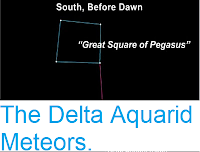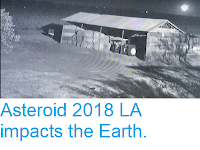The
Perseid Meteor shower lasts from late July to early September each
year, and are expected to be at a peak on Sunday 12-Monday 13 August
2018. This is immediately after the new moon on Saturday 11 August, so the shower should be quite visible with viewing unimpaired by glare from the Moon.
The radiant of the Perseid Meteors. Sky & Telescope Magazine.
The shower is caused by the Earth passing through the trail of the Comet
109P/Swift-Tuttle, and encountering dust from the tail of this comet.
The dust particles strike the atmosphere at speeds of over 200 000 km
per hour, burning up in the upper atmosphere and producing a light show
in the process.
The orbit and current position of Comet 109P/Swift Tuttle. JPL Small Body Database Browser.
109P/Swift-Tuttle is currently 37.9 AU from the Sun (i.e. 37.9 times as far from the Sun as Earth and some way outside the orbit of Neptune) and 38.7 AU from the Earth. The comet is next expected to visit the Inner Solar System in 2126, reaching about 22 950 00 km (0.15 AU) from Earth in August of that year.
See also...
Follow Sciency Thoughts on Facebook.








